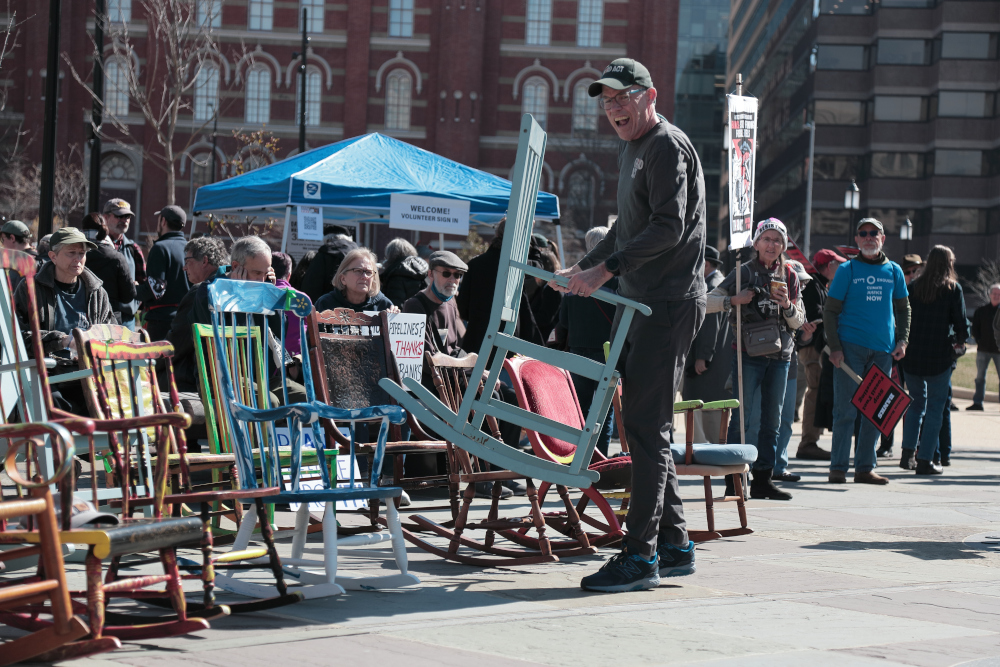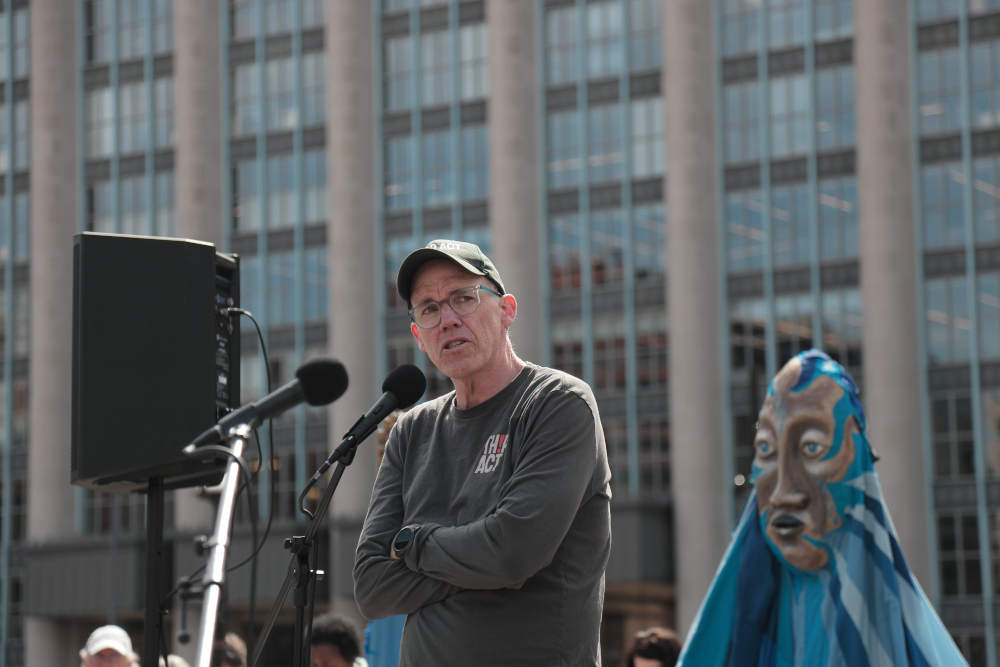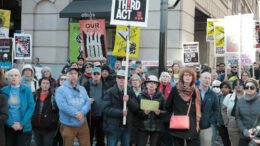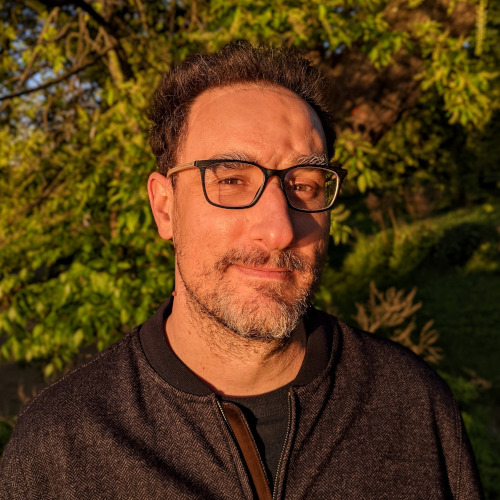Last month thousands of senior Americans took to the streets in 30 states to demand that the country’s major banks divest from fossil fuels.
This “rocking chair rebellion” — organized by Third Act, a fast-growing climate action group focused on older Americans — shows that Baby Boomers are becoming a new force in the climate movement.
Third Act cofounder Bill McKibben, who joined a Washington, D.C., protest, says it’s unfair to put all the weight of climate activism on the shoulders of young people. It’s time for older Americans to take a central role.
“Young people don’t have the structural power necessary to make changes,” McKibben tells The Revelator. “But old people do. There are 70 million Americans over the age of 60. Many of us vote, we’re politically engaged, and have a lot of financial resources. So if you want to press either the political system or the financial system, older people are a useful group to have.”
The March protests hope to build on an earlier success. In December Europe’s largest bank, HSBC, announced that it will stop investing in new oil and gas projects. McKibben says activism and pressure from Democratic politicians, many at the state and city level, will eventually force U.S. banking giants to follow suit.
“The amount of attention and anger that the climate crisis is creating keeps rising and rising and at some point, even players as big as Chase and Citi and Wells Fargo and Bank of America are going to have to listen,” he says.
These four banks provided $1.2 trillion in funding to the fossil fuel industry between 2016 and 2021 — a quarter of all the financing that oil and gas companies received in that period.
Win-Win Activism
Third Act’s National Day of Action to Stop Dirty Banks, when many people over 60 sat in rocking chairs in front of bank branches and cut their credit cards, showed that older climate activists are becoming a force to be reckoned with.

Retired Baby Boomers have plenty of time to spare, control more than two-thirds of the country’s household wealth, and their ranks are increasing rapidly. By 2050 people over 65 are expected to account for nearly 22% of the country’s population, up from around 17% at present.
Researchers are seeing an increase in climate activism among older Americans, says Karl Andrew Pillemer, a sociologist and gerontologist who is the Hazel E. Reed Professor of Human Development at Cornell University.
Older climate activists tell The Revelator that in addition to joining protests, they help increase climate change awareness in their communities, lobby local leaders and legislators, write newsletters, and join regular webinars and meetings.
One of their main motivations is the welfare of future generations.
“When people reach their 70s and beyond,” Pillemer says, “psychological research shows that they become motivated by ‘generativity’ — that is, a desire to contribute to a future that they themselves may not live to see.”
Dave Freedman, a member of Elders Climate Action, says he and his wife joined the climate movement when they retired, partially because they have two kids and two grandkids. “And we were concerned about the future for them and others. I mean, it’s not just my kids, it’s all kids and all grandkids,” the 73-year-old says.
But elders are also being prompted into action by “self-interest,” says Pillemer. Research shows that older adults are more vulnerable to air pollution and extreme heat, while they often have compromised immune systems that make them more prone to water- and insect-related illnesses, which are set to increase as the planet continues warning.
Another reason why climate action is a win-win for Baby Boomers is that there is a very clear correlation between volunteering and well-being.
“We’re trying to share this with our community members so they understand that what they’re doing isn’t just some nice to do,” says Peter Kaldes, president and CEO of the American Society on Aging. “It’s actually impacting their health and well-being in a positive way.”
A couple of years ago, Jim Thompson, the founder of THIS! Is What We Did, a climate action group for people over 50, didn’t know anyone in the climate movement.
“And now I’ve got new friends, some of the most amazingly wonderful people in the world to work with on this. It’s kind of a blessing,” he says, adding that climate activism has filled him and his peers “with a sense of purpose.”
Although people who identify as Democrats are often more likely to take part in climate action, sources say the partisan divide is not as obvious among elders. Many older Republicans have joined the climate movement because Middle America is packed with farmers and outdoorsy retirees who enjoy hunting and fishing; the kind of people who have seen the impacts of severe drought, devastating hurricanes, and floods with their own eyes.
Elders are also motivated by a sense of nostalgia. “Baby Boomers are responsible for the climate activism of the 1960s and 1970s,” Kaldes says. “What we see is a real renaissance, a real desire to revive this activism of theirs.”
Perhaps that’s why poetry, live music, dance and art installations played a central role in the March 21 protests. McKibben, who is 62, says this joviality is partly the result of the “generational muscle memory” of senior protesters who joined the Civil Rights movement back in the 1960s and the first Earth Day in 1970.

The most high-profile member of this new wave of senior climate activists is Jane Fonda. Last year the actress, feminist and long-time civil rights advocate, who is 85, unveiled a climate PAC to help elect politicians with a climate action agenda and counter the political influence of the fossil fuel industry.
Generational Divide
And yet sources say elders face many barriers when it comes to environmental activism.
Polls show that people over 60 are less likely than younger generations to consider climate change “a top concern” or get involved in climate action. In addition, many Americans don’t understand climate science well and fail to see the correlation between the climate crisis and respiratory ailments and mental health issues, and older adults are no exception. That’s why rising awareness of the climate crisis is a priority for many senior climate activists.
To make matters worse, Pillemer says some environmental organizations are not particularly “elder-friendly” and often fail to make a concerted effort to recruit older people or offer opportunities for volunteers with less physical ability, effectively creating a generational divide in the climate movement.
To fill that gap, over the past 10 years, Cornell University has run the Retirees in Service to the Environment program in New York, Florida, Illinois and other states.
RISE provides training and group support to older citizens interested in joining the climate movement. It includes six educational sessions on topics such as climate change impacts, green energy and water quality.
The final goal of the program, Pillemer says, is not just to educate older Americans but to build a movement based on “intergenerational solidarity,” because we need people of every age to save the planet.
The good thing is that many younger climate activists are welcoming Baby Boomers with open arms.
Twenty-six-year-old Giselle Herzfeld, who works for 350.org in Colorado, has been a climate activist since her late teens. On the one hand, she says high school climate activists “are crushing it,” while on the other she notes that many of her mentors are older activists who were involved in the anti-war and anti-nuclear movements decades ago.
“As a younger activist, I know there is a lot I can learn from everyone around me,” she says. “There’s just a lot of wisdom and a lot of organizing insight that older people can bring to the new generation of climate activism. It’s going to take everybody from every generation working together.”
Previously in The Revelator:
![]()


